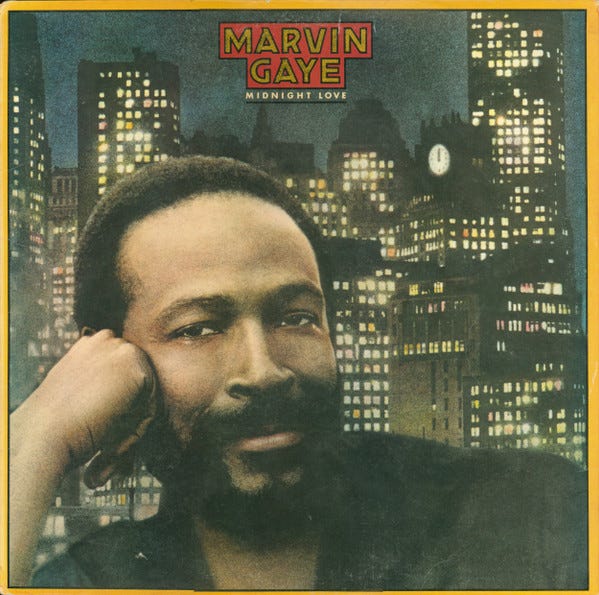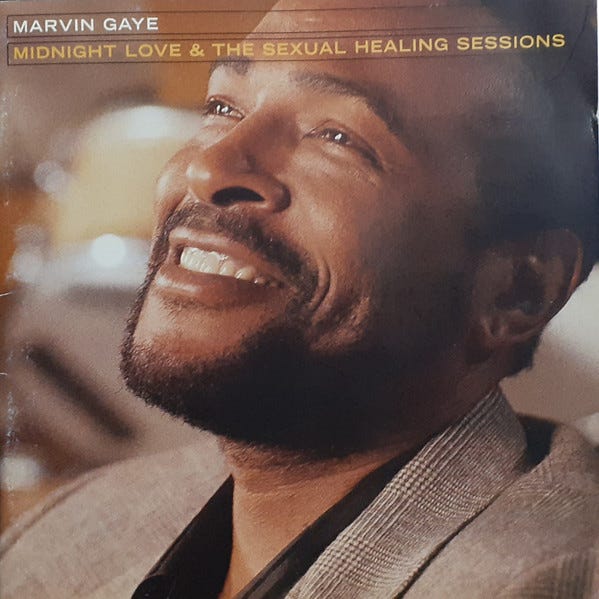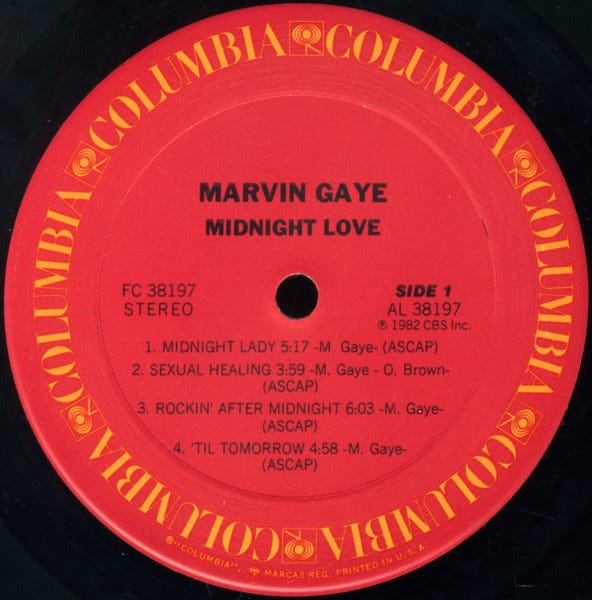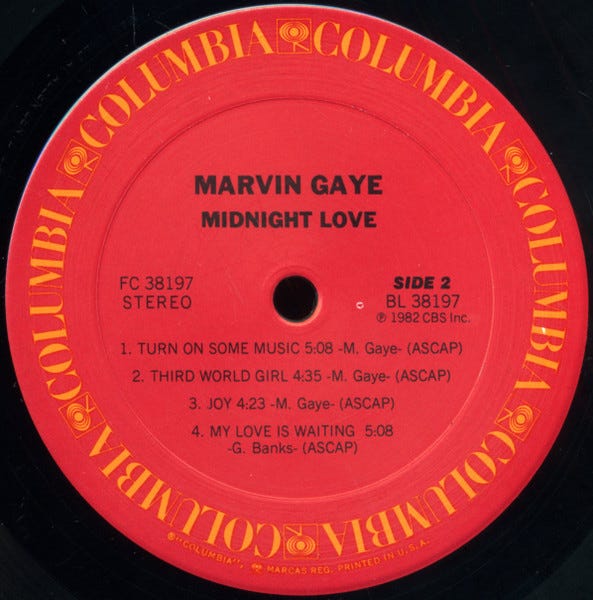Marvin Gaye's Midnight Love turns 40
one of the most impressive R&B albums ever pressed to wax, Marvin forecasts future soul and calls on his impressive instincts while exploring new ground
There isn’t a better exemplar of black cool, or of soothing intensity, than Midnight Love, Marvin Gaye’s 1982 classic release which just came up on its 40th anniversary. His atypically smooth gospel-attuned pentecostal voice stretching out across busy and sparse productions alike, the auteur’s masterwork (in my opinion) represents not just the evolution of Quiet Storm but also stands as a sonic forefather to post ‘80s rhythm and blues on the production-side, soulful synths plated with vibrant vocals laid atop.
Marvin’s first album released after leaving Motown/Tamla, pressed at Sony/Columbia/CBS records, and his last recording before his untimely murder, Midnight Love’s unfettering from Berry Gordy’s pop machinations frees its sound. The toil and strain embedded in the beauty of his Tamla wax were heretofore unwound, as Marvin’s abandon and laxness proved a fertile culture for new growth in his range and sound. Recorded in Europe (while dodging back taxes owed in the US, and precipitated by a drug-adled recovery from a second divorce and the lackluster reception of his last two albums on Motown), Midnight Love plays front to back like a party record.
There is little to no languidity on this pressing; while never overextended, Gaye’s voice pulses with renewed faith and spirit, reconnecting to God and to music created under his own direction and feeling. CBS afforded Gaye and his sessionmate/touring band member Gordon Banks two new drum machines for recording; Marvin favored the Jupiter 8, while Banks learned both the Jupiter and the newly manufactured Roland TR-808… the claps we know so well and the metallic, nearly spacial rimshots, alongside kick drums alternating between full-bodied thrumming and vacated echoing (all of which would become hallmarks of pop music for the next 40 years) all sound perfectly at home in their original temporal context. Album opener Midnight Lady’s quick and broad uptempo bass line kicks up the mood within your first five seconds of cutting the LP on, 808 claps providing an easy swing as Marvin excites and incites, an invigorated delivery which carries the LP’s energy through the rest of its 40 minute runtime. ‘Sexual Healing’ follows, cooling out and reveling in a more muted power; Marvin’s most danceable single benefits from second session musician Odell Brown’s easy touch.
Funk had been on Marvin’s mind, perhaps in his room: a personal standout midway through the album, ‘Turn on Some Music’ pulls the earliest bits of disco, pre-glitter and pre-overproduction, through Parliament’s saccharine sweat and into Marvin’s smooth and ready-for-retail soul, while Gordon Banks’ standard-setting 808 work takes a simple pop rhythm and adds the TR’s skip. Erick Sermon would later sample Marvin’s voice from this track over a boundless bassline for their co-billed single, ‘Music’, in 2001. ‘Rockin After Midnight’ plays like a better-produced, better-performed, more experimental twist on something you’d find midway through your third listen of Michael Jackson’s Thriller (released two months later); Marvin wasn’t the Prince of Soul for nothing. Setting aside who made the better end-product (controversially, I would argue it’s Marvin), it is truly curious that Sony Records managed to decamp both artists from Motown’s purview.
Midnight Love was rereleased in 1998 as a double disc (titled Midnight Love & The Sexual Healing Sessions), with additional mixes and original/demo versions of tracks that morphed during the recording process included; the new second disc illuminated the extent of Marvin’s departure from form and deviation into funk (touching a bit of Rick James, Ohio Players, and Funkadelic), reggae, and blues. ‘Til Tomorrow’, the only true ballad on the record, fashioned itself from an electric rhythm and blues demo which at once begs the recollection of Ray Charles’ pleas and simulcasts future slow songs by Joe, Carl Thomas, R. Kelly, and Jodeci; on the original, labeled ‘Baby, Baby, Baby’, the beauty of the bassist’s steady chords underlaying a sitar-like synth line and Marvin’s elastic begging makes this one of his most compelling love songs. ‘Third World Girl’, poppy and “world music influenced”, evolved from a hard reggae recording, intensely worth a listen if only to hear Marvin try his hand at the genre; there are alternate mixes of the rest of the album as well, often differing only modestly from their originals but still instrumental in understanding the creative process behind Midnight Love: experimentation receding into perfection.
‘Joy’ feeds us the kind of fusion pop the ‘80s were famous for, a synthesis of disco, ‘race’ records (as R&B was known at the time), and commercial rockism; MJ would make his solo career post-Off The Wall out of variations on this formula. Wide open, trombone-like, almost flatulent basslines characterize much of this album, but especially ‘Joy’; Marvin celebrates newfound happiness, maybe stemming from that self-imposed exile to Europe, and dips into enjoyable and brief talkbox usage (favored by the likes of Stevie Wonder, Roger from Zapp, and Daft Punk). Marvin’s grand finale, My Love is Waiting, finally mellows us on out as the party draws to a close; it sounds the most like the Marvin we knew, more meditative. It’s peak Quiet Storm, a return to Motown form as he thanks us for listening, his session musicians for their work, CBS records execs for their support, and finally, Jesus, for being there. If you’ve heard The Gap Band’s ‘Yearning for Your Love’, the sonic signature is familiar, but plays as updated, smoother; perhaps the ultimate imprint of Motown on Marvin’s sound is the gloss and polish applied to his wax. It’s perfect as denouement, reminding us why we loved Marvin for all these years and how silky cool and inviting his affection can be. As the album fades on Marvin’s serenade to an old lover he hasn’t seen in time, I can’t help but think on the family and lovers he left behind, and the love we as listeners will never forget Marvin gave us.







Written beautifully and delicately sharp. Bravo.
I will definitely listen to Midnight Love.